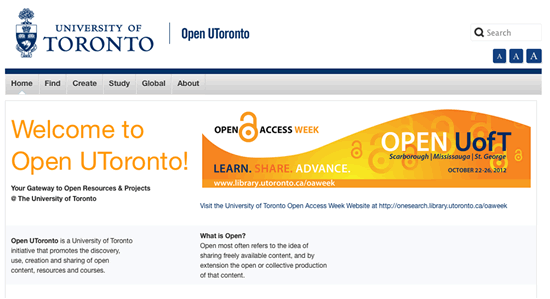Massive Open Online Courses (MOOCs) have been big news in post-secondary education for the past year as elite universities form consortia to offer these free courses to huge numbers of students around the world. Among the best-known consortia are EdX, with MIT, Harvard, and University of California at Berkeley, and Coursera, an internet course platform created by two Stanford University professors, which announced 12 partner universities in North America and Europe in July 2012 (this has now been expanded to 33). Among the first 12 Coursera partners is the University of Toronto.
Faculty in the Department of Computer Science at the University of Toronto were approached by colleagues at Stanford about joining Coursera and the university accepted the invitation in order to benefit from the experience and opportunity to learn about these online course models and their implications and possibilities.
This description looks at the first steps in investigating MOOCs at the University of Toronto. Additional descriptions will look at the experience of developing, offering, and assessing the first courses, and the university’s strategy concerning ongoing involvement in and integration of MOOCs.
Innovation
The opportunity to be involved in Coursera is part of a broader landscape of open access at the University of Toronto as exemplified in the Open.UToronto.ca web site which features open publishing, collections, and learning objects.

Instructors came forward with ideas for courses to be modified for presentation on Coursera. In each case, the initiative to undertake development of MOOCs was endorsed by senior leadership within of the academic division, signaling their support for this exploratory work. Five courses were chosen for the pilot offerings.
Course Name | Department/Faculty | Start Date | Length of Course | Registration as of November 9, 2012 |
Learn to Program: The Fundamentals | Computer Science | September 2012 | 7 weeks | 86,249 |
Neural Networks for Machine Learning | Computer Science | October 2012 | 8 weeks | 36,949 |
Learn to Program: Crafting Quality Code | Computer Science | TBA | 5 weeks | 27,679 |
The Social Context of Mental Health and Illness | Factor-Interwash School of Social Work | January 2013 | 6 weeks | 16,075 |
Aboriginal Worldviews and Education | Ontario Institute for Studies in Education | February 2013 | 4 weeks | 12,160 |
Total |
|
|
| 179,112 |
The two courses offered in fall 2012 in Computer Science provide video lectures of between one and two hours a week, broken into short segments and supplemented with readings and quizzes. One of the courses also provides stand-alone homework and optional programming assignments. Both have a non-optional final exam, so that with successful completion of the course, the student can receive a certificate signed by the instructor. The instructors estimate that students would dedicate six to nine hours a week to the course.
To support the instructors working in MOOCs, cross-divisional round tables have been organized by Laurie Harrison, the Director of Online Learning Strategies. The discussion explores topics such as what is known about effective online learning and how this can be applied to MOOCs, with particular attention to the unique challenges in offering the two social science courses to be launched in 2013.
Outcomes and Benefits
The course content developed for Coursera is being integrated into course offerings specifically for U of T students. In January 2013, students in Computer Science will study the course content on Coursera as part of an inverted classroom initiative. With students viewing the content online on the Coursera site, the class time can be devoted to discussion, group work, problem solving, and other more interaction and practical experiences.
Both current and future students can use the Coursera videos for remediation or additional learning and the quizzes as practice tests.
Extensive research will look at the benefits (and the challenges) once the courses have been completed.
Challenges and Enhancements
Faculty involved in this first iteration of Coursera had to work with a new learning platform, as well as take on a time-consuming re-design of their courses, assignments, and assessment strategies. Getting ready for Coursera was the challenge – the rest is to be learned.
Potential
The major motivation for involvement in Coursera is the opportunity to learn – “explore as we go” is the descriptor used by Laurie Harrison. The activity will be evaluated at the faculty, student, and administrative levels to ensure that the experiences, challenges, and opportunities are thoroughly tracked and integrated into online developments and institutional strategy. The learning analytics supplied by Coursera will be an important part of this analysis.
The potential for MOOCs is an open question right now, but modelling the open nature of MOOCs themselves, the research done at the university will be shared though publications, professional networks, and discussions with colleagues in post-secondary education in Ontario and beyond.
For Further Information
Academic Technology Initiatives
[email protected]
https://www.coursera.org/#utoronto
PDF: Massive Open Online Courses (MOOCs) – The First Steps at the University of Toronto


